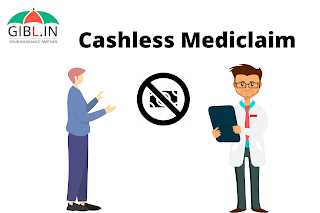A lot of insurance companies in the country provide cashless mediclaim policies. This program provides consumers with a simple way to protect themselves against rising medical costs in the event of hospitalization, without having to pay anything out of pocket.
To activate the cashless facility, insurance companies work with a number of hospitals around the country. These affiliated hospitals are also referred to as "network hospitals." When you seek treatment at one of these network hospitals, your insurance company takes over and pays all of your medical expenditures.
In the event of a medical emergency, cashless mediclaim coverage can let you relax by providing total financial support. It's a lot easier than dealing with reimbursements, where you have to pay your medical expenditures out of pocket first and then have your insurance company repay you.
Different Types of Cashless Mediclaim Policies in India
There are a variety of cashless
mediclaim policies available today in India. These are some of them:
- Individual cashless medical insurance policy: This sort of cashless medical insurance policy provides financial help to the policyholder. According to the insurance plan, a certain amount of medical coverage is supplied, which can be used to claim hospitalization expenditures as needed.
- Family floater cashless mediclaim policy: This type of cashless mediclaim policy provides coverage for all members of the family under a single policy with a single fixed sum insured. The covered members can use the financial help given under the family floater insurance for hospitalization expenditures during the policy period.
- Senior citizen cashless mediclaim policy: This form of the cashless medical insurance policy helps senior persons financially. The cashless mediclaim coverage for older citizens is designed to help them manage their hospitalization costs at the most critical times.
Challenges of a Cashless Mediclaim Plan Include:
While the cashless mediclaim policy system is a significant advancement in the insurance industry, it still has a few quirks to work out. The following are some of the drawbacks to using this feature:
- Unavailability of network hospitals: To make use of the cashless mediclaim service, you must visit only those hospitals that have been designated as network hospitals. As a result, you must be familiar with all of the hospitals on this list; otherwise, you may find yourself in danger during a medical emergency.
- Partially claim settlements: In some circumstances, the insurance provider only pays a portion of the claim in a cashless settlement. The rest is left to reimbursement, which means you'll have to pay out of pocket to cover the rest of your emergency expenses.
- Time it takes to process a claim: In some emergency situations, you may need to obtain approval from a Third Party Administrator, which may cause your claim to be put on hold. Only once they give you the go-ahead to facilitate cashless mediclaim can you acquire financial aid. During these instances, the insurance provider may ask you to shoulder the cost at first and then be reimbursed later.
- Exclusions: There are a lot of treatment costs that your medical insurance does not cover. Registration fees, food and toiletry costs, documentation costs, dental procedures, and other costs may be included. That is why, before purchasing a plan, you should thoroughly read all of the terms and conditions to avoid being surprised later.
Visit GIBL.IN, one of India's premier
insurance broking portals, to learn more about cashless mediclaim policies.
Their team of seasoned experts will walk you through every stage of the
insurance purchasing process.











No comments:
Post a Comment